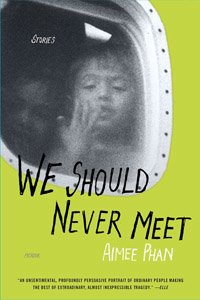we met again
 Of all the seven deadly sins, envy is the one I practice most frequently (though gluttony is a very close second). When, at age eight, I was in beginning gymnastics, the last few minutes of class were always painful because the advanced-class kids would start arriving: I watched them trickle in with their sporty leotards and I-can-do-a-back-handspring-without-a-spot posture, and nearly melted with jealousy.
Of all the seven deadly sins, envy is the one I practice most frequently (though gluttony is a very close second). When, at age eight, I was in beginning gymnastics, the last few minutes of class were always painful because the advanced-class kids would start arriving: I watched them trickle in with their sporty leotards and I-can-do-a-back-handspring-without-a-spot posture, and nearly melted with jealousy.So it was no easy task for me to go to Friday night’s reading of We Should Never Meet by Aimee Phan at the Beverly Hills Public Library. Aimee and I used to work together at the UCLA Daily Bruin. She’s really smart. She could probably do a great back-handspring if she wanted to. And now she has an MFA from Iowa and a book from a major press.
But sometimes we are rewarded for triumphing over temptation (the temptation in this case being to stay home, eat gluttonous snacks and pretend like my peer was not wildly successful; “wildly successful” in the literary world meaning that she’s still less famous than that guy from my high school who was on TNBC’s City Guys).
We Should Never Meet, a collection of connected stories about the children of Operation Babylift in Vietnam, is the kind of book that can make you forget about your own dumb non-problems: it features intense situations, sharp but un-flashy prose and characters that are familiar enough to make you think, “Oh, I know exactly what type of person she’s talking about,” yet are still distinctly individual.
Her characters include gang members, shoplifters, over-achievers and aid workers. As a fiction writer, I should know that not all writing is autobiographical (at the same time that all writing is autobiographical), but I nevertheless found myself thinking, “Wow, I wonder if Aimee hung out with a gang in high school.” Her writing is that convincing.
And it’s good to be reminded that fiction is fiction. Also that I don’t know her all that well, and she could be a gang member, really. But probably not.
This series features actors reading authors’ stories, which is an interesting twist on the typical reading format, but despite four different voices and a couple of good performances, the thing ran almost three hours long. Which is about two hours longer than the human ear’s capacity for listening to out-loud narrative. The fact that I was still into it by story number four is a testament to Aimee’s writing.
She signed my book at intermission, saying, “Oh, I want to write something really cool.”
“You don’t need to,” I assured her. “I know it’s impossible to come up with something on the spot.”
I know good writing takes time, and now I’ve got 243 pages of Aimee’s to look forward to. I may have to wait until I’m in a particularly non-envious mood to read it (and till I’m done with my current around-the-block queue), but I’m looking forward to both the book and the mood.



Comments
I don't remember what it is, but it's probably a real zinger. ;)